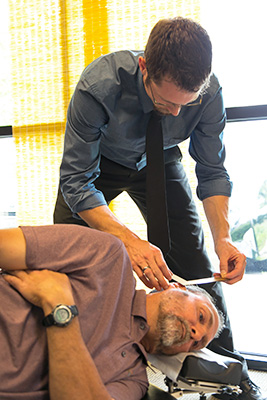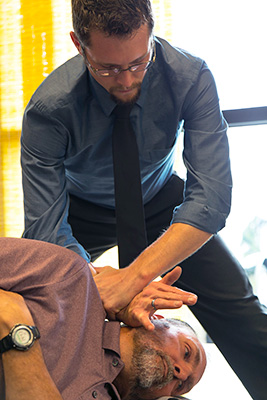
Have you ever experienced a sudden, unsettling feeling like the room is spinning around you? Maybe you've stumbled after a few drinks or woken up with a dizzying sensation that makes simple tasks feel impossible. If so, you're not alone. These disorienting experiences are all symptoms of vertigo, and surprisingly, there could be a connection to your alcohol consumption. Read on as our vertigo chiropractor in Vancouver, WA helps you understand the relationship between the two.
As we always tell our patients, vertigo isn't simply a feeling of being dizzy. It specifically refers to the false sensation that you or your surroundings are moving. While vertigo manifests as a spinning sensation, but it can also cause a tilting, swaying, or a feeling of being pulled in one direction. This unsettling symptom is commonly caused by an issue with the inner ear or vestibular system (which is responsible for our sense of balance).
Alcohol is a depressant, meaning it slows down bodily functions. It also acts as a diuretic, increasing fluid loss and potentially leading to dehydration. Both factors can have a substantial impact on the delicate mechanisms within the inner ear.
Our inner ears contain fluid-filled canals called the semicircular canals. These canals house tiny hair cells that detect movement and body orientation changes send signals to the brain to maintain balance.
Alcohol can change the density and viscosity of this inner ear fluid, temporarily disrupting the way those hair cells communicate with the brain. This disruption leads to conflicting signals about your body's position and movement, triggering the sensation of vertigo.
Benign Paroxysmal Positional Vertigo (BPPV): This is the most common type of vertigo. BPPV occurs when tiny calcium crystals (otoconia) within the inner ear break off, get dislodged from their normal place and migrate into the semicircular canals. Alcohol consumption can increase the risk of otoconia dislodgement, causing acute, short-lived episodes of vertigo brought on by head movement.
Intoxication: Even moderate alcohol consumption can temporarily impair the vestibular system (responsible for balance), especially those parts of the brain involved in processing balance signals. This can cause feelings of unsteadiness or dizziness even without true vertigo.
As a vertigo chiropractor in Vancouver, WA, Dr. Perin focuses on optimizing the function of your musculoskeletal and nervous systems with the help of gentle atlas adjustments. While medication and other therapies might play a role in managing vertigo, chiropractic care can offer a natural, drug-free approach with several benefits:

If you're experiencing recurring bouts of vertigo, especially after consuming alcohol, it's essential to consult with both your medical doctor to rule out any urgent underlying health conditions and determine the most appropriate strategy. If you’re most certain that your condition doesn’t warrant emergency care, you can look into Upper Cervical Chiropractic. This for of chiropractic care can be an incredibly valuable part of managing alcohol-related vertigo and restoring your quality of life. Book your consultation with Dr. Perin today!
To schedule a complimentary consultation with Dr. Joe Perin, call our Vancouver office at 360-597-4784. You can also click the button below.
If you are outside of the local area, you can find an Upper Cervical Doctor near you at www.uppercervicalawareness.com.



